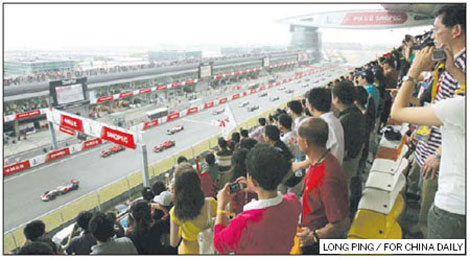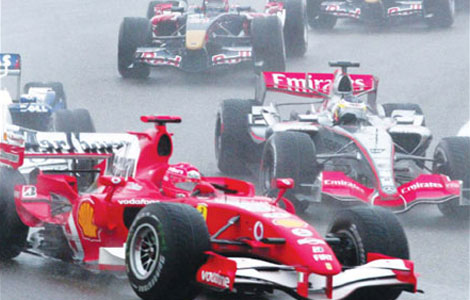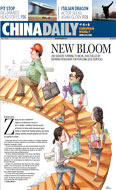Green light
Updated: 2011-04-08 11:07
By Matt Hodges (China Daily European Weekly)
 |
|
China's Grand Prix attracted more than 270,000 spectators in 2004 and the number fell to some 155,000 last year. |
UBS, which also sponsors the annual Beijing Music Festival in October, sees F1 as a crucial stepping-stone for brand building and making its Chinese clients feel important.
"The F1 UBS Chinese Grand Prix is the ideal launching pad for UBS to raise awareness of its brand via excellent branding and hospitality opportunities in one of the firm's most important markets," says David Li, chairman & country head of UBS China.
"This sponsorship not only demonstrates the firm's commitment to China, but also fulfils a core UBS value - that of supporting the communities in which it operates."
"The timing is great," says Peter Dillon, UBS' head of sponsorship for Asia-Pacific, "because of our brand reemergence and this new era of F1 in China".
UBS is bent on expanding all its business areas in China, with a special focus on research of stocks of small and medium-sized caps, says spokesperson Joanne Sin.
According to Reid, there are two key ways to judge whether sponsors are getting a good return on their investment in the pinnacle of motor sport.
"Some sponsors see their F1 involvement as the ideal business-to-business opportunity, as it gives them the opportunity to network with the other sponsors and team owners at each Grand Prix, and through this they can gain new clients and new contracts," she says. "Other sponsors look more toward the business-to-consumer benefits."
Germany's Allianz, the world's top car insurer and team partner of Mercedes GP Petronas, probably falls more into the first camp. It has set itself an ambitious agenda of getting the message of road safety out to the world's biggest car market.
"Via our global F1 sponsorship, Allianz intends to endorse the very important message of road safety - shown also through the new branding on the safety cars," says Gesa Walter, regional general manager of corporate communications for Allianz SE Insurance Management.
Like most insurers, Allianz hopes to build up its customer base in China while lowering the number of claims. If the message is picked up, its marriage with F1 may have been made in sponsorship heaven.
However there are indications that F1 sponsors in general are not satisfied with the job being done on their behalf by FOM. At the first meeting of the so-called F100 Alliance in London last September, those in attendance reportedly called for the sport to appoint its first marketing chief.
"The combined value of the investment made in F1 by the brands attending is 458 million pounds (524 million euros). As a group, they are now urging the appointment of a senior figure to raise the profile of F1 and access untapped revenues," reported marketingmagazine.co.uk. "The F100 organization identified online as an area in which it would like to see further investment."
This chimes with what Yang and his team is working on at their slick office, which brushes against Shanghai's curvaceous Huangpu River. On the one hand, Juss is working with the Shanghai tourism bureau to exploit F1's international appeal and make the city a top tourist draw. On the other, it is ratcheting up its customer care and tapping into new media to capitalize on China's status as home to the world's most Internet and cell phone users - increasing numbers of whom surf the Web on their phones.
"You have to remember that each market has its own characteristics," says Yang. "Chinese often come to watch the F1 as tourists rather than as fans, so from 2008 we started giving away wireless headphones with each ticket, and we hired two MCs to explain to them what was going on," he says.
"This year we registered our microblog on Sina.com (China's biggest Web portal) and recorded 80,000 fans in the first five weeks. We're using all kinds of new media to reach fans, including online forums and social networking. We also want to keep people happy on-site, so they'll come back."
Juss's biggest immediate target remains the people of Shanghai, but this could be expanded soon to incorporate the Yangtze River Delta region and wealthy outposts like Suzhou, which have quick and easy highway access to Shanghai.
E-paper

Green light
F1 sponsors expect lucrative returns from Shanghai pit stop
Buying into the romance
Born to fly
Light of hope
Specials

Share your China stories!
Foreign readers are invited to share your China stories.

No more Mr. Bad Guy
Italian actor plans to smash ‘foreign devil’ myth and become the first white kungfu star made in China.

Art auctions
China accounted for 33% of global fine art sales.
